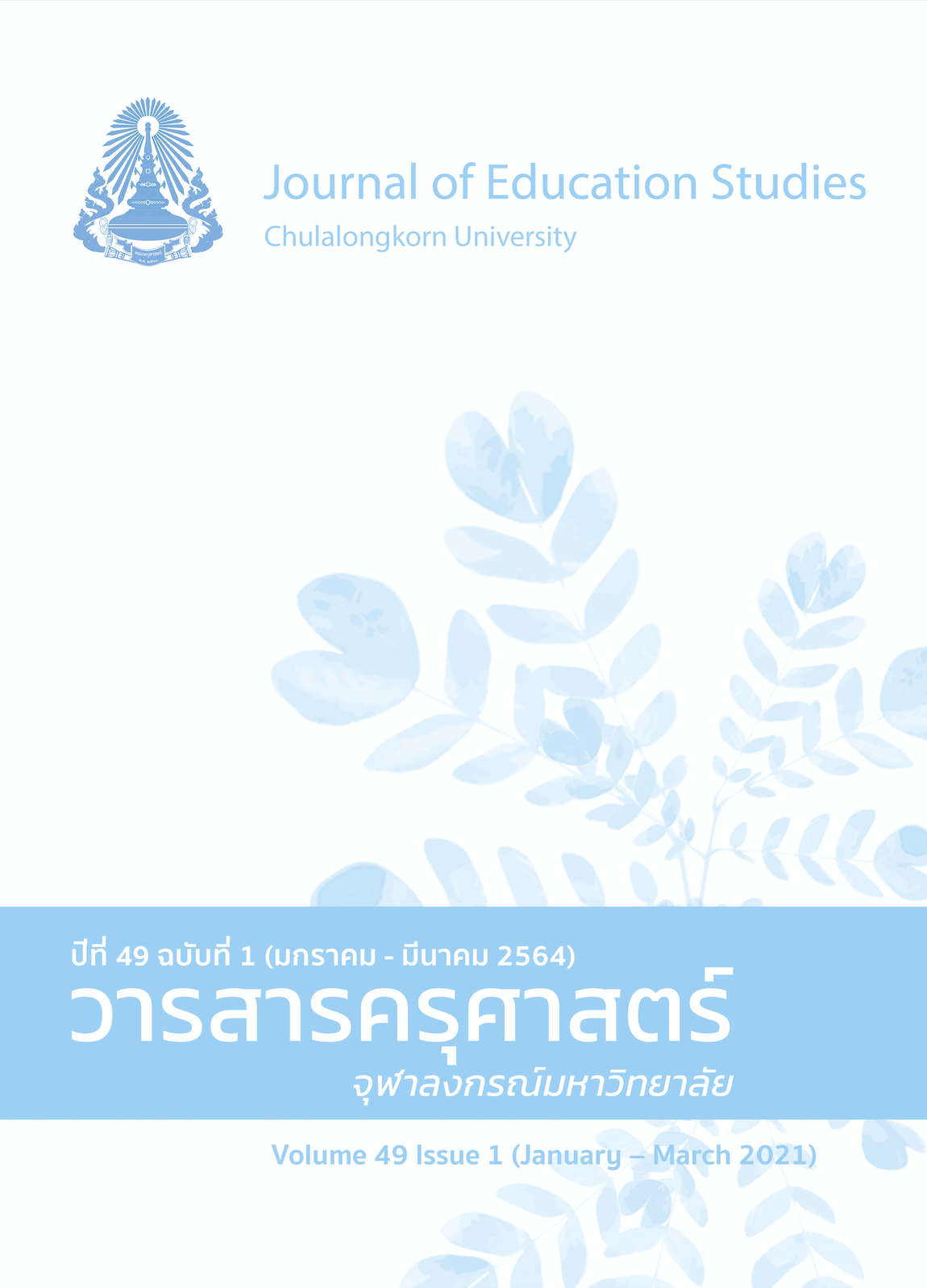Academic Management of Secondary Schools According to the Concept of the Quality Citizen Enhancement
DOI:
https://doi.org/10.14456/educu.2021.8Keywords:
academic management, secondary schools, quality citizen enhancementAbstract
The purposes of this research were to study the conceptual framework and examine the present as well as desired status of academic management strategies for secondary schools according to the concept of quality citizen enhancement. The samples were 385 secondary schools under the Office of the Basic Education Commission. Data were obtained from 973 informants comprised of school directors, deputy directors, and teachers. The research instrument was a constructed questionnaire. The data were analysed using frequency distribution, percentage, mean and standard deviation. The research results showed that the academic management of secondary school conceptual framework according to the concept of quality citizen enhancement was comprised of schooling, supervised study, development and implementation of technology media, and measurement and evaluation. The concept development for quality population contained 3 attributes. These attributes were creativity and critical thinking, having economics capability, and having virtue and responsibility. The results likewise showed that the current status of high school academic administration was at a high level (M = 3.84), and the desired academic management strategy which received the highest mean score was schooling (M = 4.67), while the lowest mean score was for media and technology development (M = 3.74).
References
กนกวรรณ อุ่นใจ, วารีรัตน์ แก้วอุไร, ปกรณ์ ประจัญบาน, และ ภูฟ้า เสวกพันธ์. (2558). การพัฒนาหลักสูตรเสริมสร้างความเป็นพลเมือง สำหรับเยาวชนไทยด้านความรับผิดชอบ. วารสารศึกษาศาสตร์ มหาวิทยาลัยนเรศวร, 17(4), 40-51.
กระทรวงศึกษาธิการ. (2550). รายงานการสังเคราะห์การใช้หลักสูตรการศึกษาขั้นพื้นฐาน พุทธศักราช 2544. สำนักวิชาการและมาตรฐานการศึกษา กระทรวงศึกษาธิการ.
เกรียงศักดิ์ เจริญวงศักดิ์. (2546). การคิดเชิงวิพากษ์. ซัคเซสมีเดีย.
สำนักงานคณะกรรมการการศึกษาขั้นพื้นฐาน. (2557). Civic education พลังเยาวชน พลังพลเมือง :
การจัดการศึกษาเพื่อสร้างความเป็นพลเมือง. สำนักวิชาการและมาตรฐานการศึกษา สำนักงานคณะกรรมการการศึกษาขั้นพื้นฐาน.
ทิพย์พาพร ตันติสุนทร. (2554). การศึกษาเพื่อสร้างพลเมือง (พิมพ์ครั้งที่ 2). สถาบันนโยบายศึกษา.
ปราโมทย์ เบญจกาญจน์. (2548). รูปแบบการพัฒนาพฤติกรรมภาวะผู้นำทางวิชาการของผู้บริหารสถานศึกษาขั้นพื้นฐาน. สถาบันพัฒนาครู คณาจารย์และบุคลากรทางการศึกษา สำนักงานปลัดกระทรวงกระทรวงศึกษาธิการ.
ปริญญา เทวานฤมิตรกุล. (2555). การศึกษาเพื่อสร้างพลเมือง (Civic education). นานมีบุ๊คส์พลับลิเคชั่นส์.
มานิต เตชอภิโชค. (2556). การวิเคราะห์แนวโน้มของเมืองในอนาคต เพื่อต้องการเน้นให้เห็นความสำคัญ ของการมีครอบครัวดี สังคมดี เมืองน่าอยู่ ด้วยการมีพลเมืองคุณภาพ มุ่งเน้นกิจกรรมร่วม ในการเพาะสร้างพลเมืองคุณภาพรุ่นใหม่ (เด็กและเยาวชน) ภายใต้แนวคิด Our 4Cs is our future. วารสารปัญญพัฒน์พัฒนาข้าราชการ กทม., 32(3), 4-22.
รุ่งรัชชดาพร เวหะชาติ. (2550). การบริหารงานวิชาการสถานศึกษาขั้นพื้นฐาน. ศูนย์หนังสือมหาวิทยาลัยทักษิณ.
สำนักงานคณะกรรมการข้าราชการครูและบุคลากรทางการศึกษา. (2551). นโยบายการพัฒนาวินัยและจริยธรรมการจัดการและพฤติกรรมองค์การ ข้าราชการครู. สำนักงานคณะกรรมการข้าราชการครูและบุคลากรทางการศึกษา.
สัมฤทธิ์ บุญนิยม. (2548). การเปรียบเทียบผลสัมฤทธิ์ทางการเรียนเรื่องพืชและสัตว์ของนักเรียนชั้นประถมศึกษาปีที่ 6 สอนด้วยวิธีสอนโดยใช้แผนที่ความคิดกับวิธีสอนตามด้วยเครื่องมือครู [วิทยานิพนธ์ปริญญามหาบัณฑิต ไม่ได้ตีพิมพ์]. มหาวิทยาลัยศิลปากร.
เอกชัย กี่สุขพันธ์. (2527). หลักบริหารการศึกษาทั่วไป. อนงค์ศิลป์การพิมพ์.
ภาษาอังกฤษ
Cronbach, L. J. (1970). Essentials of psychological testing (3rd ed.). Harper & Row.
Yamane, T. (1973). Statistics and introductory analysis. Harper & Row.
Downloads
Published
How to Cite
Issue
Section
License

This work is licensed under a Creative Commons Attribution-NonCommercial-NoDerivatives 4.0 International License.




